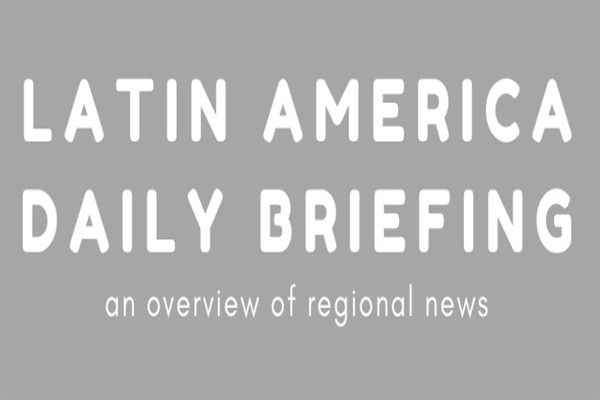
News Briefs
Regional Relations
- Argentine President Alberto Fernández called on countries in the region to resume full diplomatic relations with Venezuela, yesterday. Fernández said UN Human Rights chief Michelle Bachelet’s work with the Maduro government has paid off, and that many “problems have dissipated with time.” He said diplomatic support would help the government’s dialogue with the political opposition prosper. (El País)
- The statement aroused criticism internationally, including from Human Rights Watch, which stressed that Venezuela will not “function normally” again if reality is “hidden.” (EFE)
Mexico
- Mexico’s lower house of Congress passed an amendment to mining legislation in order to nationalize the country’s lithium reserves, a day after the bill was sent to lawmakers by President Andres Manuel Lopez Obrador, reports Reuters. Lopez Obrador sent the proposal to Congress after the defeat on Sunday night of a broader electricity sector overhaul he had championed. (See yesterday’s post.)
- Lawmakers’ rejection of AMLO’s proposed energy reform reflects a general understanding of the dangers civil society has marked regarding the bill, Ana Lilia Moreno of México Evalúa told Americas Quarterly. (See yesterday’s post.)
Chile
- Chile’s lower house rejected dueling proposals for a new round of pension fund withdrawals, a blow to President Gabriel Boric’s government that sought to block one plan with an alternative designed to avoid further inflation, reports Bloomberg. (See last Wednesday’s briefs.)
Guatemala
- Guatemala’s much criticized attorney general, Consuelo Porras, will seek a second term in office. Under her watch, the country’s judicial situation has deteriorated significantly, and she has led efforts to retaliate against anti-corruption prosecutors and judges, reports the Associated Press.
Venezuela
- A 72-year-old Venezuelan woman was arrested for making satirical political commentary with arepas in a TikTok video. Olga Mata de Gil has been charged under the Law Against Hatred, which forbids the promotion of “fascism, hatred, and intolerance.” Under the law, publishing “messages of intolerance and hatred” carries prison sentences of up to 20 years. (Washington Post)
Migration
- An influx of migrants from the Ukraine at U.S. borders adds to the record influx of newcomers from Latin America and the Caribbean this year, according to new U.S. Customs and Border Protection figures. The Ukrainians, a portion of which arrived at the U.S.-Mexico border form part of a larger group of more than 220,000 detentions on the Southwest border in March, the highest monthly total since 2000, reports the Washington Post.
- U.S. and Cuban officials are due to meet in Washington on Thursday to discuss migration concerns, reports Reuters. They will be the highest-level formal talks between the two countries since U.S. President Joe Biden took office last year. The U.S. wants Cuba to take back more deportees from among the record numbers of Cubans arriving at the US-Mexico border, while Cubans say U.S. Cold War style policies are to blame for the uptick in irregular migration. (Reuters)
- The U.S. Coast Guard stopped an overloaded sailboat at sea packed with 132 people from Haiti on Sunday, in what is becoming a daily occurrence, reports the Miami Herald.
Brazil
- Brazil’s environmental misgovernance is not solely a symptom of bad regulation: under President Jair Bolsonaro transgressions have been intentional. Last month Brazilian Federal Supreme Court Justice Cármen Lúcia acknowledged the systematic violation of several constitutional principles by the Bolsonaro administration. The statement resulted from an unprecedented hearing of seven environmental cases, labelled the “green package” by local media. (Brazil Research Initiative)
- Bolsonaro criticized messaging platform WhatsApp for not launching in Brazil its new feature called Communities until this year’s presidential election is over. The messaging service said it is testing the new tool to organize groups in larger structures that could be used by workplaces or schools. (Reuters)
- Whatsapp groups — since restricted — were a key tool in Bolsonaro’s political rise, particularly used to spread fake news, reports the Columbia Journalism Review.
- Brazilian Vice President Hamilton Mourão, a former army general, said crimes committed during the country’s military regime cannot be investigated because “all those people are dead.” (Mercopress)
Argentina
- Argentina’s government announced special one-off bonuses for the country’s neediest, in order to compensate for sky-high inflation — 6.7 percent last month. The government said it will fund the bonuses with a tax on companies that saw “unexpected income” generated by the war in Ukraine, reports Reuters.
- The case of doctor being prosecuted for providing an abortion in Argentina’s Salta province demonstrates the challenges of implementing the legal abortion lawmakers passed a year and a half ago. The minister of women, gender and diversity, Elizabeth Gómez Alcorta, has called the charges an attempt to “discipline” doctors who are guaranteeing a right, reports the Guardian.
Ecuador
- IMF austerity measures have hindered Ecuador’s efforts to reduce emissions, reports Foreign Policy. Because of Ecuador’s domestic austerity measures, many of the actions it is taking to green its economy are only possible with foreign backing.
Colombia
- Ex-guerrilla Gustavo Petro, who leads in opinion polls ahead of Colombian elections next month, signed an oath not to expropriate property if he becomes the country’s first-ever leftist president, reports AFP.
Dominican Republic
- Dominican Republic President Luis Abinader has high approval and the country is growing, but region-leading inflation amid global price hikes threaten his rosy promises, reports Americas Quarterly.
Arts
- Mexico’s pavilion at the Venice Biennale will feature artists who say they want to challenge the nation’s legacy of colonialism, violence and discrimination. Mexico’s cultural authorities support the difficult discussions and want the world to know that Mexico is staring down its internal demons, reports the New York Times.
- A group of Mexican female film-makers, emerging and established, are tackling gender violence in their work, creating urgent and disquieting cinema that brings the Mexico’s horrors into the spotlight, reports the Guardian.
—
Latin America Daily Briefing —
http://latinamericadailybriefing.blogspot.com
—












